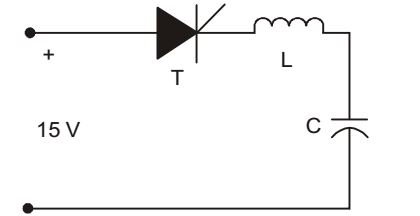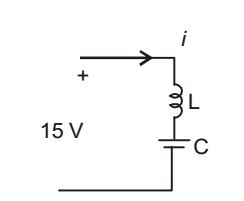Power electronics and drives miscellaneous
- The average power delivered to an impedance (4 – j3) Ω by a current 5 cos (100 πt + 100) A is
-
View Hint View Answer Discuss in Forum
Z = 4 – j3 = RL – jXC; RL = 4;
I = 5 cos (100πt + 100) = Im cos2 (ωt + α)P = 1 Im2 .RL = 1 × 52 × 4 = 50 W 2 2 Correct Option: B
Z = 4 – j3 = RL – jXC; RL = 4;
I = 5 cos (100πt + 100) = Im cos2 (ωt + α)P = 1 Im2 .RL = 1 × 52 × 4 = 50 W 2 2
- Thyristor T in the figure below is initially off and is triggered with a single pulse of width 10 µs.
It is given that L = 
100 
H and C = 
100 
F. π π
Assuming latching and holding currents of the thyristor are both zero and the initial charge on C is zero, T conducts for
-
View Hint View Answer Discuss in Forum
When thyristor ON


Is = L[bI / s] + 1 I(s) s c s 
Correct Option: C
When thyristor ON


Is = L[bI / s] + 1 I(s) s c s 
- A voltage 1000 sin ωt Volts is applied across YZ. Assuming ideal diodes, the voltage measured across WX in Volts is

-
View Hint View Answer Discuss in Forum
‘D’ 0 for all +

Note :
⇒ All diode conducts only done negative half.
⇒ XW is at symmetrical point so voltage across XW is zero for all time.Correct Option: D
‘D’ 0 for all +

Note :
⇒ All diode conducts only done negative half.
⇒ XW is at symmetrical point so voltage across XW is zero for all time.
- In the circuit shown below, the knee current of the ideal Zener diode is 10 mA. To maintain 5 V across RL, the minimum value of RL in Ω and the minimum power rating of the Zener diode in mW respectively are

-
View Hint View Answer Discuss in Forum
Is = Iz + IL
Is – Iz = IL
Two extreme condition :
If Iz (min),then IL (max)
If Iz (max) then IL (min) = 0Iz (max) = Is = 10 - 5 = 50 mA 10
Iz (min) = Is – IL (max)
IL (max) = Is – Iz (min) = Is – Iz = (50 – 10) = 40mARL (min) = V = 5 K = 125 Ω IL (max) 40
Pz = Vz × Iz (max) = 5 × 50 mA = 250 mwCorrect Option: B
Is = Iz + IL
Is – Iz = IL
Two extreme condition :
If Iz (min),then IL (max)
If Iz (max) then IL (min) = 0Iz (max) = Is = 10 - 5 = 50 mA 10
Iz (min) = Is – IL (max)
IL (max) = Is – Iz (min) = Is – Iz = (50 – 10) = 40mARL (min) = V = 5 K = 125 Ω IL (max) 40
Pz = Vz × Iz (max) = 5 × 50 mA = 250 mw
- In the feedback network shown below, if the feedback factor k is increased, then the

-
View Hint View Answer Discuss in Forum
Input Independence of a voltage-voltage feedback circuit = Zi (1 + A0 k)
Zi = initial input impedance (without feed output
Impedance of a voltage-voltage feedback circuit = Z0 / (1 + A0 k)
Z0 = initial output impedance (without feedback)
Hence, As K is increased, the input impedance will increase and output impedance will decrease.
Correct Option: A
Input Independence of a voltage-voltage feedback circuit = Zi (1 + A0 k)
Zi = initial input impedance (without feed output
Impedance of a voltage-voltage feedback circuit = Z0 / (1 + A0 k)
Z0 = initial output impedance (without feedback)
Hence, As K is increased, the input impedance will increase and output impedance will decrease.

